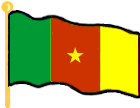Ashia-o-o-o
"I think 'ashia' comes from the English expression 'Hush ya'." -Nyango
Ashia-o-o-o
Hush Ya
Children's Song
Children's Song
(Cameroonian Pidgin English)
(English)
Lead: Ashia-o-o-o
Rest: Njama
Lead: E-o-o
Rest: Njama, njama
Lead: Hush ya
Rest: Njama*
Lead: E-o-o
Rest: Njama, njama.
Notes
Nyango sent this song with the note about "Ashia":
"…this wonderful word we have in Cameroonian Pidgin English: "Ashia". In my interest in tracing or making educated guesses as to the origin of some words, I think "ashia" comes from the English expression "Hush ya". It is one of our richest words as you tell:
1) a sick person - "ashia" - as in offering your sympathy, take it easy
2) in a bereavement - Ashia will signify condolences to the bereaved
3) if you hurt yourself, you'll get "Ashia"
4) in admiration for a great action
5) Sarcastically to mean "yeah, right!"
6) for a good deed - birth, marriage, passing an exam - Ashia will be congratulations, you're doing well, etc.and many more expressions. The tone and facial expression makes a difference to the meaning of "Ashia" as used by the speaker."
*Nyango wrote: "Njama njama is our pidgin English word for many kinds of leafy vegetables. Our mother often sang this song to one of us when we fell or had one of those childhood incidents. After telling you "ashia", she got you to smile by starting this song and the rest of us - my siblings and I will answer the parts in italics. Before long, all of us, including the one who was hurt will be in a great mood! My mother's name is Iya Elizabeth Baliki Nambangi. She loves singing so much my siblings and I inherited the trait. She, as most Cameroonian mothers, can make up a song in a flash, to suit any occasion. In fact, in 2005, she got to sing before a class of students at the University of Mainz in Germany because of a paper my younger sister wrote leading the teacher to invite our mother to come and speak and sing with them. You won't believe the song. It was: "three gypsies stood at the castle gate, they sang so high they sang so low..." The teacher called it: "Mrs. Nambangi's version". In fact, at funerals in my culture, that of the Oroko people of the South West Province of Cameroon, you get to compose a song that lauds a deceased parent for everybody to learn and sing."
Thanks and Acknowledgements
Many thanks to Nyango M. Nambangi of the Minnesota African Women's Association for contributing this song and for telling us about the singing traditions in Cameroon.
Thanks so much!
























